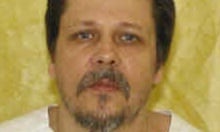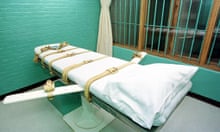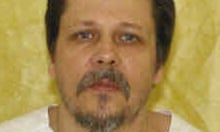The last time I celebrated mass with Dennis McGuire, who was executed by the state of Ohio last week using an experimental two-drug concoction, it was the feast of the epiphany that marks the bringing of gifts to the newborn Jesus by the magi.
McGuire was one of just over a dozen Catholics among Ohio's 147 death row inmates who come to mass weekly in Chillicothe Correctional Institution. As part of the sacrament of anointing, I asked the others to pass by and lay hands on McGuire as a way of giving our brother back to the Lord as a symbolic gift. When I turned round to face them with the oils, I found the other 12 standing around him, surrounding him as though they were offering him back to the Lord. Tears were streaming down McGuire's face. That was the first time I'd ever seen him show physical signs of emotion.
I first began to visit Mcguire in November. He told me about the evil act he had committed, the murder in 1989 of a young woman Joy Stewart who was pregnant and whose unborn child also died. He confessed his sin to me, and expressed sorrow for what he had done. I said he should pray for forgiveness from the woman he had killed, and from that unborn child, and over the course of the final eight weeks, I know that he did.
After that, I had to deal with him as I do anyone else who repents: as a forgiven sinner. It can be very difficult for people not in the religion to accept that with regard to a murderer, but the faith is clear: once forgiven, you are forgiven, no matter how heinous the sin.
On the day of his execution, last Thursday, I gave him his last sacraments at Southern Ohio Correctional Facility, which lodges the "death house". Shortly before the execution was due to start, his son, daughter and daughter-in-law, who were with him at the time, asked me to come with them as witness. McGuire also said he wanted me there as his spiritual adviser.
I felt nauseous before I entered the room, as I had never seen an execution before. As the execution got underway, the nausea passed and was replaced by an intense feeling that I wanted to get out of that room, away from the horrendous act that was playing out before me.
I've seen people die many times before: in nursing homes, families I've known, my own mother. In most settings I've found death to be a very peaceful experience. But this was something else. By my count it took 26 minutes for McGuire to be pronounced dead.
We sat down in the death house – McGuire's children and daughter-in-law in the front row and me in the row behind them. At about 10.15am he was brought in and strapped to the gurney. With his arms spread and, not to put too fine a point on it, I whispered to his daughter that he looked as though he were on the cross.

He made his final statement. He said thank you to Joy Stewart's family who had offered him some words of comfort in a letter they had written to him, and he told his children that he loved them and would see them in heaven. They began to put lines into him. That was unsettling, as from what I could observe they seemed to find it hard to get insert the IV and there seemed to be blood coming from his right arm.
At 10.27am, the syringe containing the untested concoction of midazolam and hydromorphone was injected into him. At 10.30am, three minutes into the execution, he lifted his head off the gurney, and said to the family who he could see through the window: "I love you, I love you." Then he lay back down.
At about 10.31am, his stomach swelled up in an unusual way, as though he had a hernia or something like that. Between 10.33am and 10.44am – I could see a clock on the wall of the death house – he struggled and gasped audibly for air.
I was aghast. Over those 11 minutes or more he was fighting for breath, and I could see both of his fists were clenched the entire time. His gasps could be heard through the glass wall that separated us. Towards the end, the gasping faded into small puffs of his mouth. It was much like a fish lying along the shore puffing for that one gasp of air that would allow it to breathe. Time dragged on and I was helpless to do anything, sitting helplessly by as he struggled for breath. I desperately wanted out of that room.
For the next four minutes or so a medical tech listened for a heart beat on both sides of his chest. That seemed to drag on too, like some final cruel ritual, preventing us from leaving. Then, at 10.53am, the warden called the time of death, they closed the curtains, and that was it.
I came out of that room feeling that I had witnessed something ghastly. I was relieved to be out in the fresh air. There is no question in my mind that Dennis McGuire suffered greatly over many minutes. I'd been told that a "normal" execution lasted five minutes – this experimental two-drug concoction had taken 26 minutes. I consider that inhumane.
His family had been exposed to something horrendous. They cried and sobbed, held each other, held onto my hand, and at times turned away to hug each other so they didn't have to watch. And then there's the family of Joy Stewart, who I think were sitting next to us on the other side of a wall. I pray for them because I know they too have been through hell and back. My heart goes out to them, but I don't see how his death will bring them peace. All it means is that they witnessed somebody else die.
I have opposed the death penalty since I studied philosophy in college 40 years ago. My objection is based on a simple principle: all human beings are created with the ability to change, from what is not yet to what is, and that's as true in the womb as it is heading for the tomb. There can always be repentance.
To interrupt that process is to deny people the chance to repent of what they have done. Capital punishment is simply a way of society avoiding the possibility of changing lives. I'm not advocating the release of any of Ohio's death row inmates into society – they have all committed heinous acts, and society must be protected from them. But by incarcerating them, they pose no more threat. Everybody wants to play God instead of believing in him. That applies to the murderer as much as to all of us. In my opinion, the death penalty is nothing more than an exercise in vengeance that rightly should be reserved to the lord.
Putting my opposition to the death penalty to one side, there remains what I saw with my own eyes last Thursday. I don't know how any objective observer could come up with any conclusion other than that was an evil act.
Now that almost a week has passed, and I've had time to reflect, I ask that the governor of Ohio or the legislature end the death penalty in this state. It serves no purpose. People must seize this culture of death and stop it.
On Monday, I came to the prison for my usual weekly mass. I asked the remaining Catholic inmates whether they wanted to know what had happened to their brother. Most said they did, so I told them straight out, sparing them few details.
Some of them came up to me after the mass to talk. Ironically, they began to console me, saying that they were sorry that I had been forced to go through such a terrible experience. I found myself oddly comforted by that. I know they were being genuine – I've been with them long enough to sense when I am being played. For me, that underlines a vital truth: that even among men who have done such brutal things, redemption can be found.









